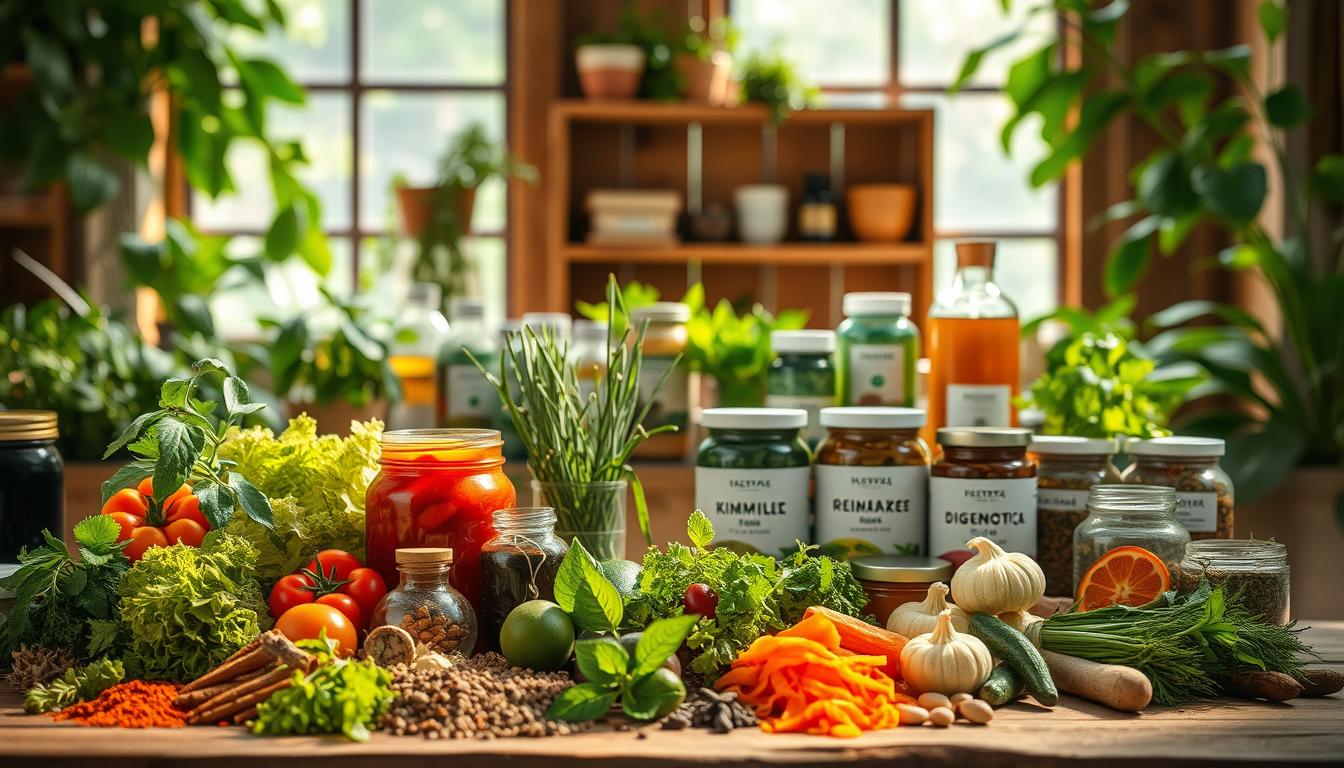Ever felt a knot in your stomach after eating something bad? Or a foggy mind when you’re not digesting well? Your gut is key to your health. More people are choosing natural solutions because they work with your body.
Natural remedies like probiotic foods can change your digestion. This guide is for those wanting to try holistic health. You’ll learn about fermented foods, fiber, and staying hydrated. These can help with bloating and balance, giving you control over your gut health.
Key Takeaways
- Modern lifestyles often disrupt gut balance, making natural remedies a vital digestive health solution.
- Probiotics in foods like yogurt or sauerkraut can restore gut microbiome harmony.
- Simple changes—like adding fiber or staying hydrated—support long-term gut wellness.
- Holistic health approaches focus on root causes, not just symptoms.
- This guide covers everything from fermented foods to lifestyle tweaks for better digestive health.
- Click here for best results
Understanding the Importance of Gut Health
Your gut is more than just for digestion. It’s the heart of your digestive health and overall well-being. A healthy gut microbiome boosts your immunity, mood, and energy. It’s key to holistic health. Let’s see why taking care of your gut is important.
The Connection Between Gut Health and Overall Wellness
Scientists say your gut is like a “second brain” because it makes serotonin, which affects your mood. A balanced gut also strengthens your immune system, fighting off sickness. Bad gut health can cause brain fog, tiredness, and weak immunity. This shows why natural ways to improve gut health are essential.
Signs of an Unhealthy Gut
- Bloating or irregular bowel movements
- Frequent stomach pain or acid reflux
- Unexplained skin rashes or allergies
- Chronic fatigue or mood swings
How Modern Lifestyle Affects Your Digestive System
Processed foods with lots of sugar and additives mess with your gut bacteria. Stress and antibiotics can harm your gut’s balance. Not moving enough also slows down digestion, leading to more problems.
The Science Behind Your Gut Microbiome
Your gut microbiome is like a bustling city inside your digestive system. It’s home to trillions of bacteria, fungi, and other microbes. These tiny residents help break down food, fight germs, and even influence your mood. Scientists call this community your gut flora. Just like a garden needs care, your gut microbiome thrives when nurtured properly.
From birth, your gut microbiome starts forming. Breast milk feeds “good” bacteria in babies, while later diet and lifestyle shape its diversity. A balanced gut flora supports healthy digestion and immune function. But when harmful microbes take over, problems like bloating or fatigue can arise.

Beneficial bacteria, like Lactobacillus, aid digestion by breaking down nutrients. Harmful types, such as certain E. coli strains, disrupt this harmony. Think of them as neighbors: friendly ones keep the peace, while troublemakers cause chaos.
| Beneficial Bacteria | Harmful Microbes |
|---|---|
| Lactobacillus (supports digestion) | E. coli (can cause upset stomach) |
| Bifidobacterium (boosts immunity) | Salmonella (linked to food poisoning) |
Recent studies highlight how gut flora diversity affects mental health. A 2023 review found gut imbalances may influence stress responses. This two-way street shows why maintaining a balanced microbiome matters for overall health.
Nutritionists say diversity is key. Like a garden needing varied plants, your gut thrives with probiotic-rich foods. This science backs the natural solutions coming up later.
Common Digestive Issues and Their Natural Solutions
Many digestive problems can be solved with simple, natural remedies that boost digestive health. Let’s look at safe, science-backed ways to tackle everyday discomforts. These methods avoid harsh medications.
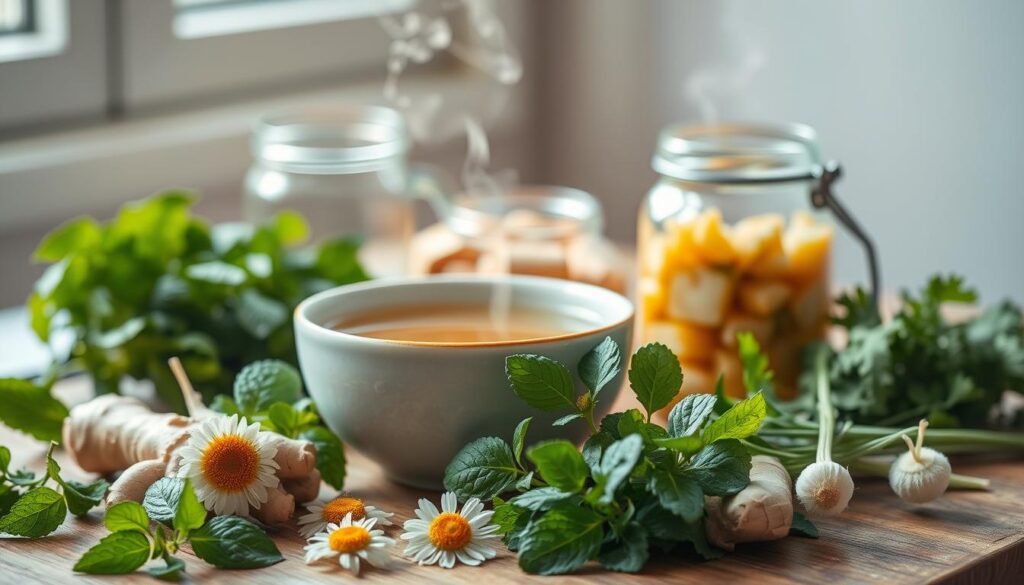
Addressing Bloating and Gas Naturally
Bloating often comes from trapped gas or food intolerances. Try ginger tea after meals or chew fennel seeds to soothe your gut. Stay away from carbonated drinks and big meals. Eating slowly can also help by reducing swallowed air.
If problems persist, a dietitian can help find out what foods trigger them.
Combating Constipation with Natural Approaches
Drink plenty of water and eat more fiber with foods like chia seeds and lentils. Triphala, a traditional herb, can help move your bowels. Daily walks or yoga poses like the cat-cow stretch also encourage natural movement.
Limit processed snacks to avoid slowing digestion.
Soothing Irritable Bowel Syndrome Symptoms
Peppermint oil capsules might ease cramping, and stress-reduction practices like deep breathing can curb flare-ups. Try an elimination diet by cutting out common triggers like dairy or gluten for two weeks. This can show what you’re sensitive to. Keep a meal journal to spot patterns.
Natural Relief for Acid Reflux
Raise the head of your bed to prevent nighttime reflux. Slippery elm tea can comfort your esophagus. Avoid acidic foods and tight clothes after meals. Peppermint oil might help, but avoid it if heartburn gets worse.
Work with a doctor to find and fix underlying issues like hiatal hernias.
Powerful Probiotic Foods for Optimal Gut Flora
Nature’s own probiotics are found in fermented foods. They offer a natural way to improve gut health. These foods add live beneficial bacteria like Lactobacillus and Bifidobacterium to your gut.
Fermented Foods as Natural Probiotics
Global cuisines celebrate foods like yogurt, kefir, sauerkraut, kimchi, kombucha, and miso. Each has its own way of supporting gut flora:
- Yogurt (unsweetened) has live cultures like Lactobacillus bulgaricus.
- Kefir
- is a tangy drink with 10+ probiotic strains.
- Sauerkraut uses lactic acid to preserve cabbage and boost digestive enzymes.
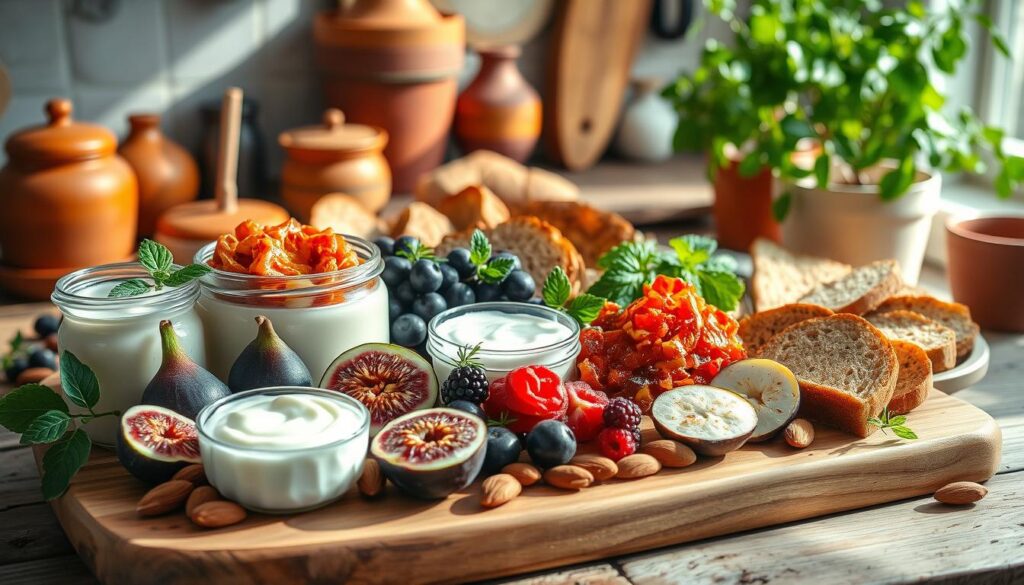
How to Add Probiotics to Every Meal
Start small by adding miso to salads or kimchi to scrambled eggs. Mix kefir into overnight oats. Pair probiotics with foods like bananas or onions to feed your gut flora. Here are some ideas:
- Smoothie boost: Blend yogurt with spinach and berries.
- Snack swap: Choose probiotic-rich pickles instead of chips.
- Weekend project: Mix kombucha with sparkling water for a fizzy mocktail.
Create Fermented Foods at Home
Homemade ferments need just salt, a jar, and patience. Start with sauerkraut: shred cabbage, mix with sea salt, pack into a jar, and wait 3–7 days. Clean tools are key—sterilize jars and use filtered water. Start with small batches to build confidence before trying kimchi or water kefir grains.
Prebiotic Foods: Feeding Your Beneficial Bacteria
Prebiotics are like food for your gut microbiome. They are non-digestible fibers and carbs that reach your colon. There, they nourish the gut flora that helps with digestion. Think of them as fertilizer for your inner garden—without them, even the best probiotics can’t thrive.
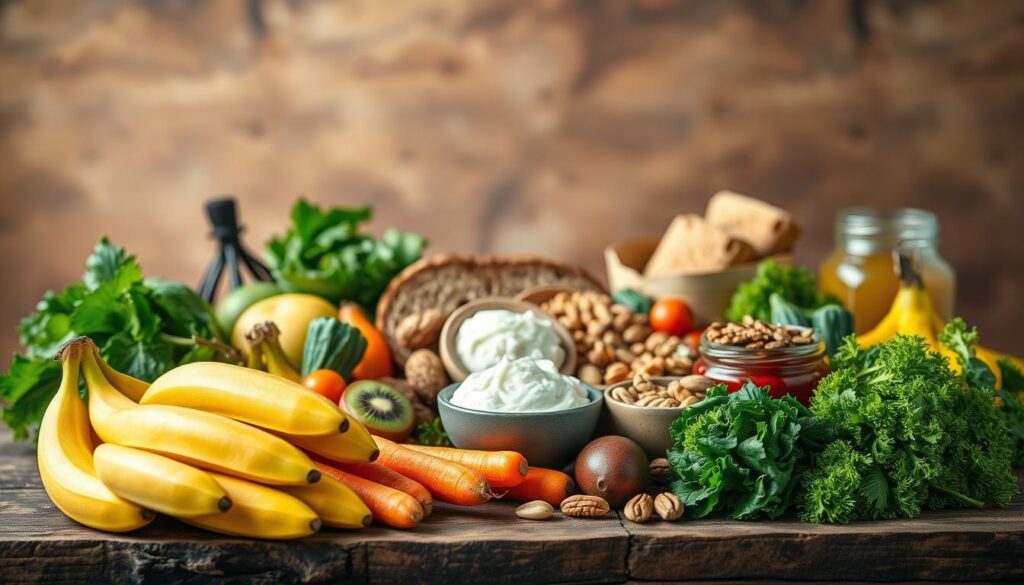
- Garlic and onions (stimulate beneficial bacteria growth)
- Jerusalem artichokes and asparagus (rich in inulin)
- Bananas and apples (contain pectin fibers)
- Oats and flaxseeds (support regularity)
“Synbiotics—combining pre and probiotics—enhance nutrient absorption and immune function,” notes a 2023 Journal of Nutrition study.
Start small to avoid bloating. Mix chopped raw garlic into salad dressings, sprinkle flaxseeds on yogurt, or bake with oat flour. Gradually increase portions to let your body adapt. Pair prebiotics with probiotic-rich foods like sauerkraut for a synergistic gut boost.
Nourish your gut flora daily—your digestion will thank you! Small changes like adding leeks to soups or snacking on raw apples can make a big difference over time.
Gut Health Natural Alternatives to Conventional Treatments
Many people look for gut health natural alternative solutions. They turn to herbal, aromatic, or culturally rooted methods. These methods fit with holistic health ideas, providing gentle support that goes well with modern medicine.
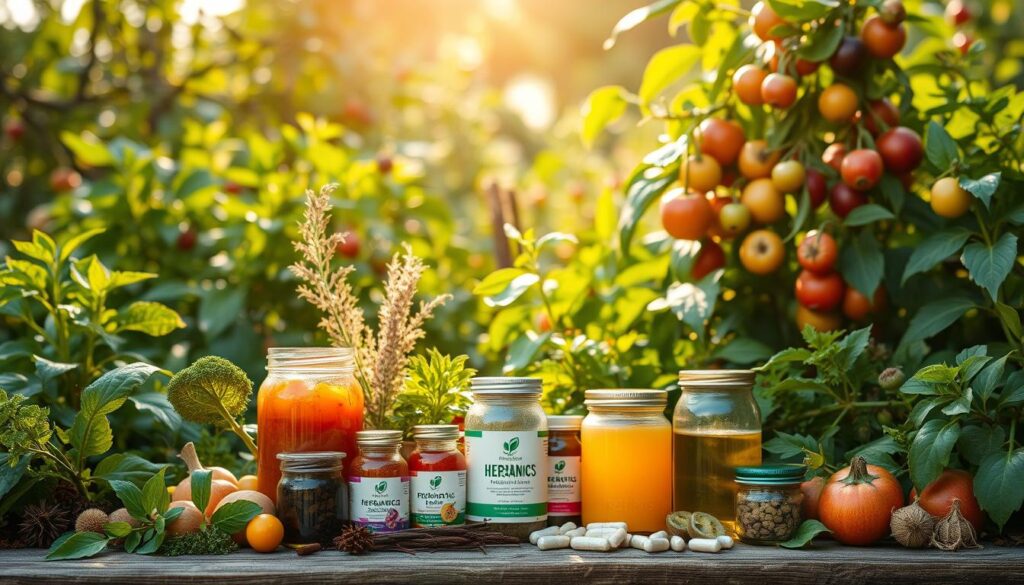
Herbal Remedies for Digestive Support
Herbs like ginger, peppermint, and slippery elm are backed by research. They offer safe options for digestive issues. You can use them as teas, capsules, or tinctures. Here are some examples:
- Ginger tea: Steep fresh root in hot water for upset stomach relief
- Peppermint oil capsules: May help with IBS symptoms when taken as directed
- Marshmallow root: Available in powder form to mix with water
Essential Oils for Gut Health
Peppermint, fennel, and lavender oils can help with digestion. Always dilute 1-2 drops in carrier oil or inhale via diffusion. Safety note: Avoid ingesting oils without professional guidance. Here are some ways to use them:
- Abdominal massage with diluted oils for cramps
- Diffuser blends to promote relaxation
- Steam inhalation with fennel oil before meals
Traditional Healing Practices for Digestion
Cultural wisdom offers proven techniques. Ayurveda’s “agni” concept emphasizes eating in sync with digestion cycles. Traditional Chinese Medicine uses licorice root in decoctions, while Native American traditions recommend chamomile for calming the gut. These practices focus on:
- Ayurvedic food combining principles
- TCM herbal decoctions for qi stagnation
- Indigenous methods like turmeric root teas
Always talk to a healthcare provider before stopping prescribed treatments. These natural remedies can work alongside conventional care. They help create a personalized wellness strategy.
The Role of Fiber in Maintaining Digestive Wellness
Fiber is a key player in keeping your digestive system healthy. It helps balance your gut microbiome and ensures smooth digestion. Most Americans don’t get enough fiber, but small changes can make a big impact. Let’s explore how different types of fiber work and how to add them to your diet.
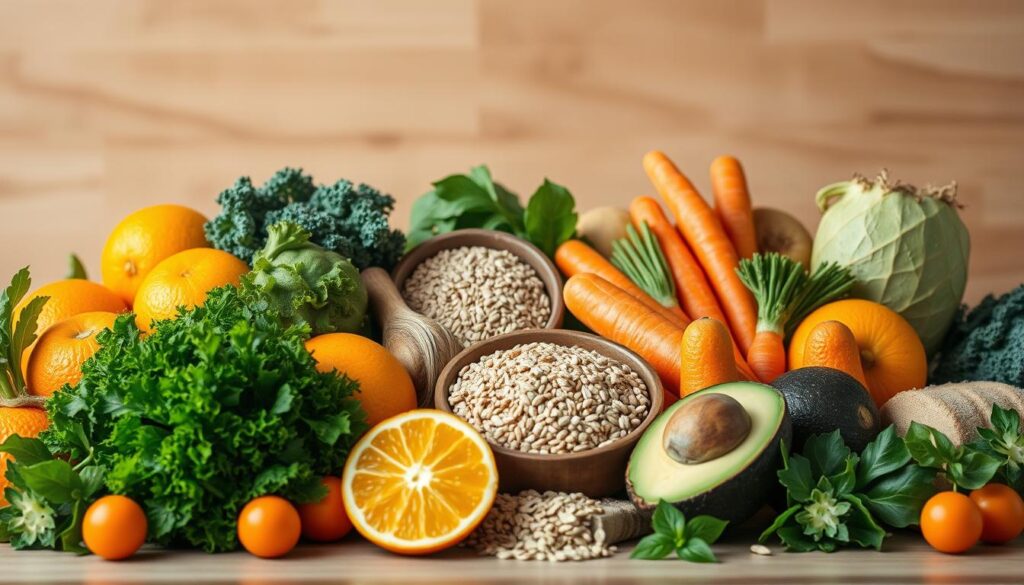
Soluble vs. Insoluble Fiber: Understanding the Difference
- Soluble fiber dissolves in water, creating a gel that slows digestion. It feeds the gut bacteria, helping with nutrient absorption. Foods like oats, apples, and lentils are great sources.
- Insoluble fiber helps with constipation by speeding up digestion. It adds bulk without causing discomfort. Whole grains, carrots, and nuts are good options.
Top High-Fiber Foods to Add to Your Diet
Here are some high-fiber foods to try:
- Soluble-rich options: Oatmeal, chia seeds, and berries. Try overnight oats with chia and berries for a fiber-packed breakfast.
- Insoluble powerhouses: Brown rice, broccoli, and popcorn. Swap white rice for brown in stir-fries to sneak in more fiber.
Start by adding 1-2g extra fiber per day to avoid bloating. Mix both soluble and insoluble sources for balanced digestion. Try roasted chickpeas as a crunchy snack or blend spinach into smoothies for a fiber boost.
“Fiber’s dual role—feeding microbes and aiding elimination—makes it essential for a thriving gut ecosystem.”
Make fiber a tasty part of your diet with these swaps and recipes. Your gut and microbiome will appreciate it!
Hydration and Gut Health: The Overlooked Connection
Hydration is key for digestive health, but many don’t realize its importance. Water helps break down food, softens stool, and boosts nutrient absorption. Without enough water, the gut can’t stay balanced, upsetting the microbiome and mucous membranes.
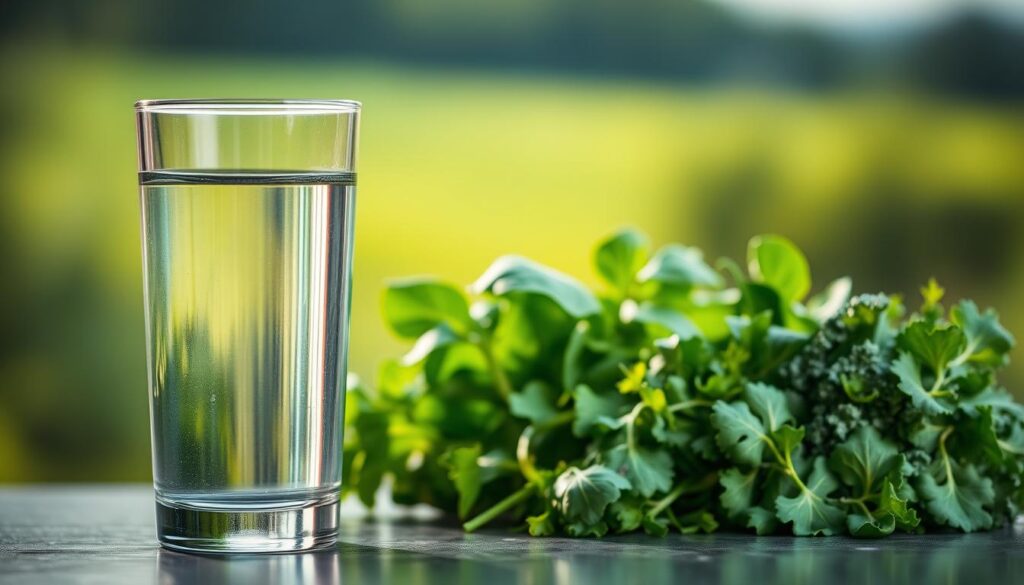
- Prevents constipation by keeping stools soft
- Supports enzyme function during digestion
- Maintains gut lining integrity
Dehydration can lead to bloating, slow digestion, and an unbalanced gut. But, hydration needs vary:
| Option | Benefits |
|---|---|
| Filtered Water | Reduces toxin intake while hydrating |
| Herbal Teas | Calming effect on the digestive tract |
| Bone Broth | Electrolytes support fluid balance |
When to drink water is important. Drink 20-30 minutes before meals to avoid diluting stomach acid. Add mint or citrus to water for taste. Herbal teas like fennel or chamomile can also help soothe digestion. Even soups and broths add to your hydration, thanks to their sodium and potassium.
FAQ: Does coffee count? While it adds fluids, caffeine can dehydrate you. Drink extra water to balance it out. Aim for 8 cups a day, adjusting for how active you are.
Hydration is more than just drinking water—it’s a holistic approach to health. Making small changes can make a big difference for your gut health.
Supplements That Support a Healthy Gut Microbiome
Choosing the right supplements can boost gut health. Probiotics, digestive enzymes, and other options are backed by science. But how do you pick the best ones? Let’s explore.
When to Choose Probiotic Supplements
Probiotics come in different strains and serve various purposes. Look for Lactobacillus acidophilus for digestion or Bifidobacterium bifidum for immunity. Make sure the label lists CFUs (billions) and strains. Use supplements if foods alone aren’t enough—like after antibiotics or during travel.
- Check for shelf-stable packaging to ensure live strains.
- Avoid blends with fillers or artificial additives.
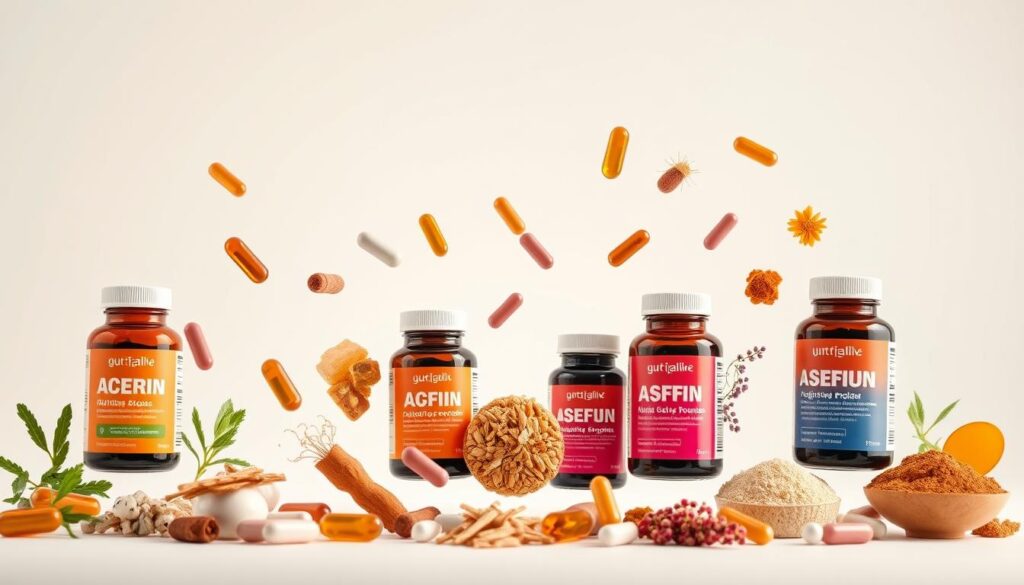
Decoding Digestive Enzymes
Enzymes like amylase, lipase, and protease help digest food. If you experience bloating or undigested food, you might need them. They work best with a diet rich in fiber.
Other Gut-Friendly Supplements
Here are some evidence-backed options:
- L-glutamine: Repairs gut lining (5–10g daily).
- Zinc carnosine: Shields the gut lining from stress damage.
- Slippery elm: Soothes irritation (follow label instructions).
Always check for quality: third-party tested brands ensure purity and potency.
“Supplements are tools, not fixes. Pair them with diet and lifestyle changes for best results.”
Supplements are a natural alternative for gut health when used wisely. Focus on strains and dosages backed by research. Always consult a healthcare provider before adding new supplements, even if managing health conditions.
Lifestyle Changes for Long-Term Digestive Wellness
Improving digestive health is more than just food. It’s about your lifestyle too. Making small changes in your daily routine can have a big impact. Start by managing stress better.
The gut and brain are connected, so stress can affect your digestion. Try mindful breathing for five minutes a day or yoga to relax your nervous system.

Getting enough sleep is also key. Aim for 7-9 hours each night. Avoid screens before bed and keep your bedroom cool. Poor sleep can upset the balance of gut bacteria, causing bloating or irregular bowel movements.
- Move daily: A 20-minute walk boosts gut motility.
- Chew food thoroughly: Aim for 20-30 chews per bite to ease digestion.
- Limit chemical exposure: Choose organic produce and filtered water to reduce toxin intake.
Try natural remedies like lavender oil for relaxation or peppermint tea after meals. Even small actions, like eating without distractions or keeping a gratitude journal, help. It’s about being consistent, not perfect, for holistic health.
| Area | Action | Benefit |
|---|---|---|
| Stress | Meditation | Reduces gut inflammation |
| Sleep | Consistent bedtime | Restores gut balance |
| Activity | Walking | Encourages healthy gut movement |
Every small choice you make adds up. Focus on these lifestyle changes, along with your diet, for lasting digestive health and overall wellness.
Conclusion: Embracing Natural Approaches for Your Gut Health Journey
Your gut health journey begins with small steps. Using natural methods like probiotics and remedies can greatly improve your digestion. Foods like yogurt and bananas help grow good bacteria in your gut.
Drinking plenty of water and eating fiber-rich foods also help. Everyone is different, so try different things to see what works for you.
Remember, achieving holistic health takes time. It involves your diet, lifestyle, and making smart choices. If you’re feeling bloated or uncomfortable, talk to a doctor.
Many doctors now use natural treatments along with traditional medicine. They create plans that fit your needs. Trust that your body can heal with the right care.
Good gut health is more than just digestion. It’s about having more energy, clearer skin, and being more focused. Small changes, like drinking water or eating healthier snacks, can make a big difference.
Don’t worry about being perfect. Focus on making progress. By taking care of your gut with natural remedies and good habits, you’re investing in your health for the long term. Your gut’s health is a journey worth taking, one step at a time.
